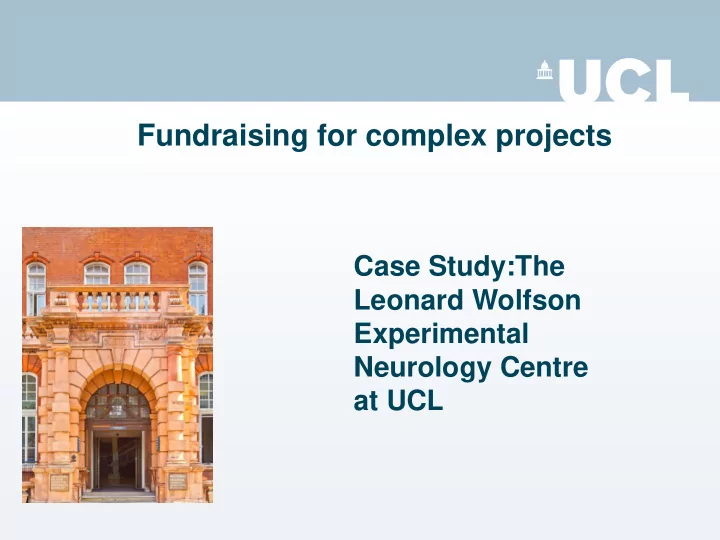

Fundraising for complex projects Case Study:The Leonard Wolfson Experimental Neurology Centre at UCL
The academic need Neurodegenerative diseases include Alzheimer’s disease and Parkinson’s disease, as well as less common but equally devastating conditions such as Huntington’s disease and motor neurone disease. They are the main cause of dementia in the UK, the 6th leading cause of death and a major cause of disability and residential care placement. Dementia alone costs the UK economy £23billion a year – yet government and charitable investment in dementia research is 12 times lower than spending on cancer research
The academic potential • Year long 2 stage bid process in response to a specific call • Collaborative working across UCL involving: – SLMS – Institute of Neurology – Dementia Research Centre – Institute of Cognitive Neuroscience, – UCLH – National Hospital for Neurology and Neurosurgery ……including Provost, Vice Provosts and Deans • Eight Principal Researchers and a wider group of 20+ key neuroscientists • Specialists in Neurodegeneration - Alzheimer’s, Parkinson’s, CJD, Prion disease and Huntingdon disease • Wolfson Foundation awards £20million to UCL
The vision • Clear academic vision of the opportunity • Project board set up immediately • Key staff from across the University brought in early • Wide consultation • High level leadership • High level involvement • Development involved from the earliest stage
The process • Regular board meetings with leadership, PIs, DARO, Estates teams and partners • Project board met fortnightly over a six month period • Involvement across the institution • Each PI and board member taking responsibility for a specific area of the programme • Close contact • Two principle writers • Development involved from the earliest stage
The Leonard Wolfson Experimental Neurology Centre • Accelerate the development of treatments and identify future therapeutic targets for neurodegenerative diseases, with the aim of earlier intervention for patients. • Focus on early intervention • Slow or delay progression of neurodegeneration • Sharing knowledge across disease areas
What will happen in the Leonard Wolfson Centre? • Refurbishment, decanting and equipping of existing space at the heart of the NHNN • Staffing – Researchers, physicists, analysts, pharmacists, technicians, nurses • Day to day running • Teaching programme
What worked well • Clear vision and leadership • Will of everyone involved to work quickly and take responsibility for specific areas • Academic excellence • Involvement of Development function early • Open and supportive process • Good institutional knowledge by all
Challenges! • Booking time across many diaries! • Coordinating key people to make decisions on programme elements • Maintaining coherent voice when many people working on different elements of the writing – even tense and tone • Creativity – where Development can really add value
Paul Ramsbottom, Chief Executive of The Wolfson Foundation, said: “The grant reflects our commitment to supporting this vital area of science and addressing the crisis of neurodegenerative disease facing an ageing population. In these times of austerity, the Foundation has taken the bold decision to commit £50 million of funding during 2011 including our largest single grant of £20million – recognising that much other philanthropic support is under pressure. “We developed an extremely rigorous review process for the award, with advice provided by a team of internationally acclaimed scientists, chaired by the former Dean of the Harvard Medical School. The standard of the competition was extremely high and UCL’s bid was of exceptional quality. “This award is an appropriate legacy for our former chairman, Lord Wolfson. During his lifetime and under his guidance his family trusts committed over £1 billion of funding in real terms for good causes.”
The Leonard Wolfson Centre Team!
Recommend
More recommend